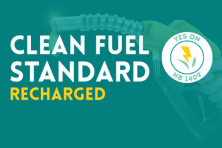Earth Day turns 51 this year against a vastly different backdrop of climate and environmental issues and momentum to address them. While Earth Day began as an effort grounded in political action, it has continued to inspire commitment to all sorts of environmental causes including broader conservation, endangered species, and our modern climate movement. As we look back at how different our world is 50 years later and continue to reckon with the roots of racism in environmentalism at large, we are also on the precipice of real substantive change.
Big resolutions, promises, and potential for action
The world came together this morning for President Biden’s Virtual Earth Day Summit. Joined by leaders from around the world, President Biden committed the US to cutting its emissions at least in half from 2005 levels by 2030. The announcement was big and came with outsized commitments from countries including Canada (reducing its greenhouse emissions levels 40 percent to 45 percent from 2005 levels by 2030), India (installing 450 gigawatts of renewable energy capacity by 2030), Japan (cutting emissions 46 percent below 2013 levels by the end of the decade), and China (phasing out coal by 2025 and reaching carbon neutrality by 2060).
Biden’s administration has already gotten to work fast in a concerted effort to reverse and move beyond the Trump administration’s disastrous environmental record. So far we’ve seen big moves to create a clean energy workforce, potential for executive action on climate, and securing nominations for leaders like Deb Haaland. Yet notably big issues like DAPL have remained unresolved. Biden continues to call for bipartisan cooperation in shaping the clean energy transition, but Republican efforts to blockade and stall are beginning to take shape. And while many in the environmental community see today’s announcements as the just the beginning or a chance to dream big about the next decade, we have a long way to go in ensuring a full transition off fossil fuels.
Want to learn more about how the US is remaking climate policy? You can tune in to CNN’s Climate Town Hall tomorrow at 10 PM ET.
Oil still digs deep in our bones and banks
The world's biggest banks made headlines last year for naming climate change as part of good investment strategies and this year was no different as the conversation within finance increasingly looks more and more climate-friendly. But recent reports show that talk is easy. Three out of every four board members at seven major US banks (77%) have current or past ties to climate-conflicted companies or organizations – from oil and gas corporations to trade groups that lobby against reducing climate pollution. Climate envoy John Kerry has called on banks to act beyond promises, but the ties between money and fossil fuels run deep.
Clean energy rising in the Northwest
As the legislative session winds to a close in Washington and Oregon, both states are again at the forefront of enacting substantive climate policy to reduce emissions. Washington is poised to see both the passage of a clean fuel standard to significantly reduce transportation emissions, as well as putting a price on carbon, making it just the second state to do so after California. These efforts have not come easy, with resistance even by State Democrats and Republicans continuing to deny efforts will have any positive impacts. Washington’s session ends Sunday and if the Legislature passes both pieces, is poised to change the game on climate and clean transportation policy nationwide. Meanwhile, Oregon looks to be among an elite group of states who are legally committed to 100% clean electricity with a bill moving through its Legislature this session. Oregon’s biggest county recently committed to all-electric buildings, continuing to make the case for leadership and action on clean buildings from local jurisdictions.
One thing you can do
Live in Oregon or Washington? There's a couple last things to do this legislative session to help push climate policy over the finish line for the year.
Oregon
Tell your legislators to support 100% clean energy and stronger local energy efficiency standards with House Bills 2021 and 2398.
Washington
Washington is so close to passing into law a firm cap on global warming pollution across the entire state. Only one other state has done it, and few others are trying right now. Tell your legislators to pass the Climate Commitment Act before session ends.





